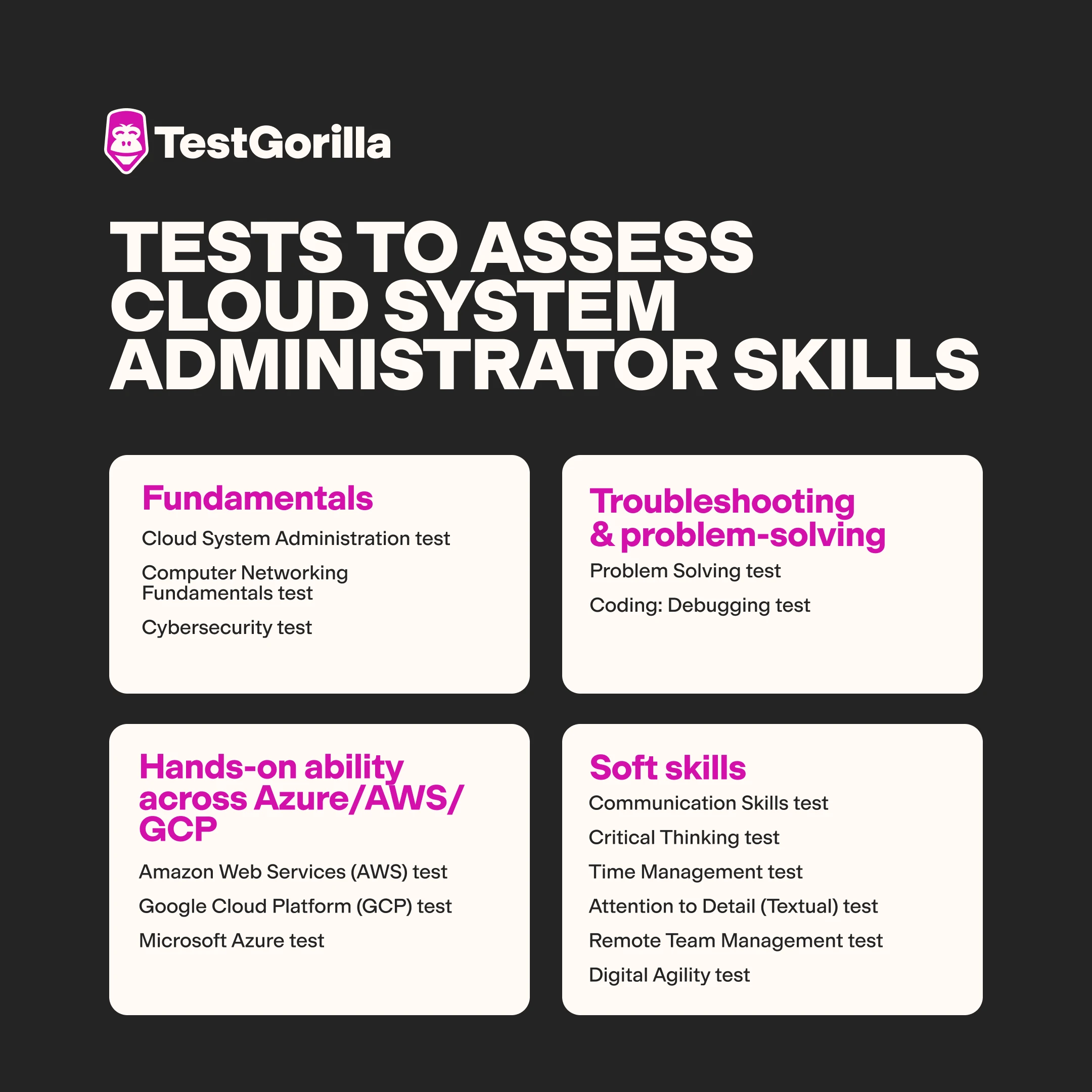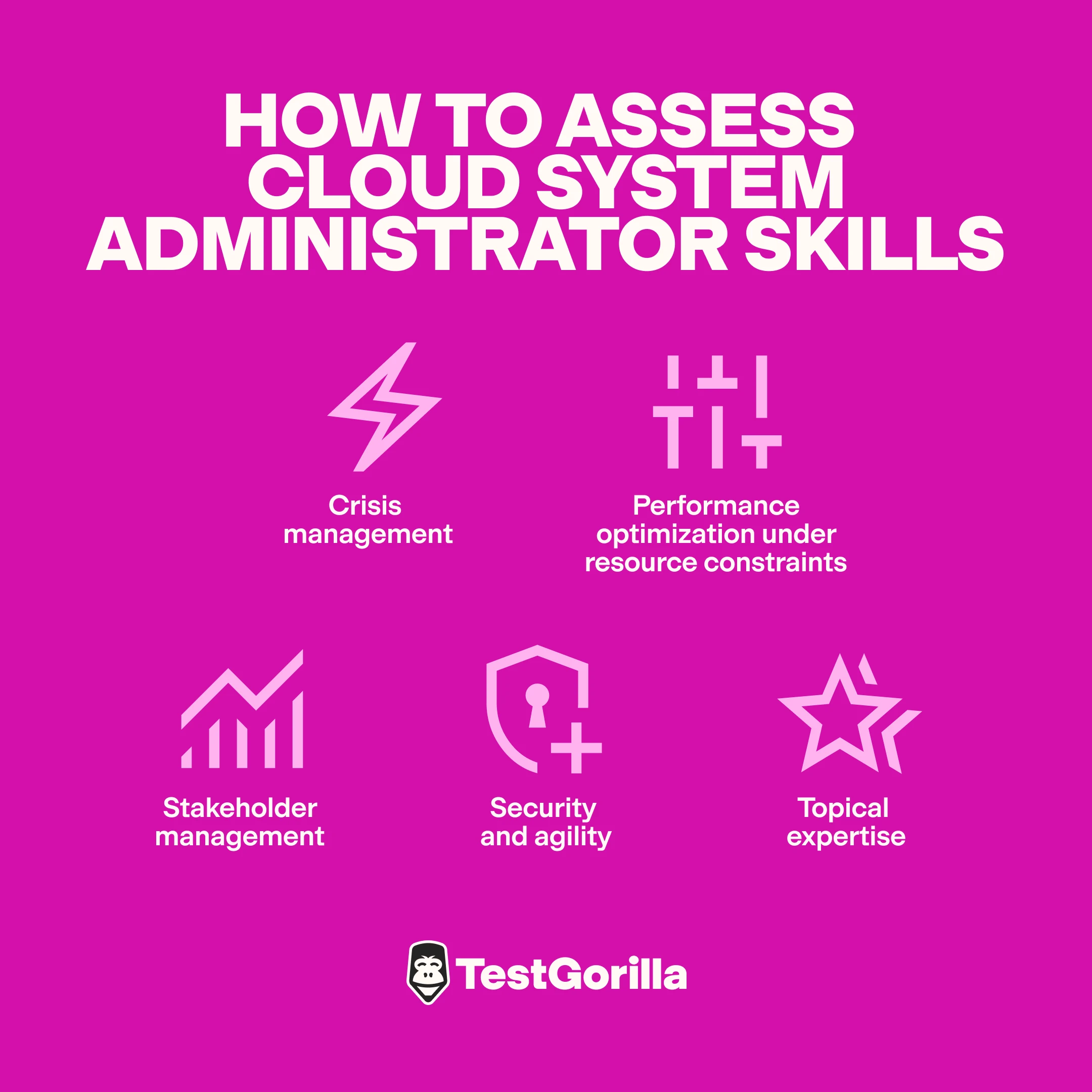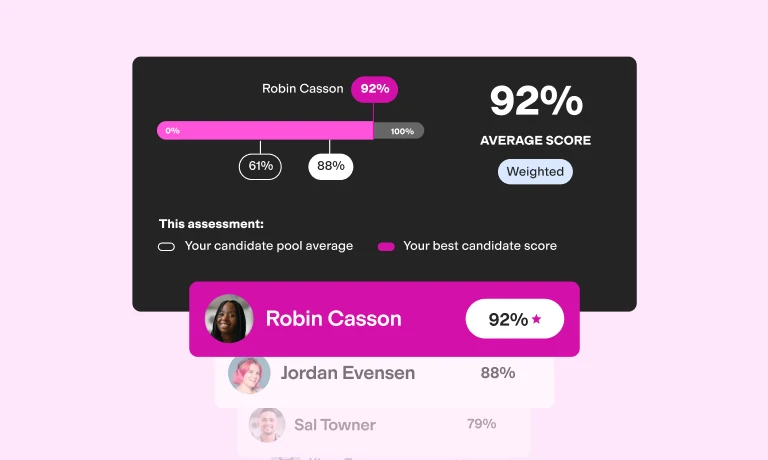Your expert-backed guide to assessing cloud system administrator skills
Picture this: You post a cloud system administrator job description, and within hours, your inbox is overflowing. Nearly every resume looks the same: computer science degree, Amazon Web Services (AWS) certifications, and claims of cloud expertise.
With so many applicants appearing like strong candidates based on their resumes, how can you tell who actually has the skills required for the role?
This guide gives you the answer.
We’ll share expert ways to evaluate cloud system administrator skills and explain how talent assessments (like TestGorilla’s Cloud System Administrator test) can help you find top candidates.
Properly evaluating cloud system administrator skills is more important than ever
Cloud system administrators (often called cloud sysadmins) carry significant responsibility. They keep an
organization’s entire digital infrastructure running smoothly, and their work directly addresses top cloud concerns, including maintaining security, ensuring cost efficiency, handling software licensing, and supporting governance.
But the person capable of doing all that isn’t always the one with the most impressive resume or longest list of certifications.
And the need for professionals like this is only growing.
Gartner predicts that 90% of organizations will adopt a hybrid cloud approach by 2027. This means demand for skilled cloud sysadmins will soon skyrocket, and the role will become increasingly business-critical.
That’s why it’s crucial to properly evaluate cloud system administrator skills. You have to be sure your candidates can handle complex systems, solve problems under pressure, and keep your cloud environment secure and efficient. Otherwise, you risk costly mistakes, downtime, and even a damaged business reputation.
Resumes alone can’t prove those network administrator abilities. The smarter move is to start with objective, science-backed skills assessments, then use expert interview techniques to dig deeper.
Let’s get into it.
Assess cloud system administrator skills the expert way
Check the fundamentals first
Before anything else, you have to ensure your cloud system administrator candidates understand the universal principles that make any cloud run. As Bobby Dorlus, CEO of #TheTechHustle, tells TestGorilla, you have to test “fundamentals before platform trivia.”
Begin by giving your candidates a few skills tests. These from TestGorilla are great options:
The Cloud System Administration test, which tests candidates’ ability to install, configure, and maintain systems across Windows and Linux, as well as their knowledge of AWS/Azure cloud fundamentals and networking.
The Computer Networking Fundamentals test, which evaluates intermediate networking and protocol knowledge, including network hardware and software, local area network (LAN) types, network/transport/application layers, and network security.
The Cybersecurity test, which assesses how well candidates understand security risks and best practices, including access control, threat detection, and data protection in the cloud.
Did you know? All 350+ of TestGorilla’s tests are created with subject matter experts, so you can be confident that each one measures the skills that actually matter for your open role. For example, Yevgen G. – an experienced system administrator, cybersecurity analyst, security engineer, and security researcher – helped create our Cloud System Administration test.
Once you’ve confirmed which candidates know the basics, invite the top performers to interviews.
Dorlus tells us that, at this stage, he always aims to confirm “fluency in the building blocks that are true across AWS, Azure, Google Cloud Platform, and [on-premises technology].” You can do the same by asking candidates to:
Explain how core elements like “compute, storage, networking, [and] IAM” work together.
Compare Amazon Elastic Compute Cloud (EC2) and virtual machines (VMs) to physical hosts.
Describe when and why they’d use Amazon Simple Storage (S3) or object storage versus block storage.
Break down concepts like subnets, routing, security groups (known as Network Security Groups, or NSGs, in Azure), and least-privilege IAM in clear, simple terms that others can understand.
Explain how to design for observability (e.g., by using centralized logs and metrics), cost efficiency (such as by turning off non-critical resources when idle), and fault tolerance (like through multi-zone setups).
“Strong candidates [will] explain why they’d choose primitives – [like a] VM plus [load balancer] plus object storage – before higher-level abstractions, and can discuss failure modes and rollback strategies,” Dorlus notes.
Additionally, Dorlus asks candidates to walk through how the stack connects – “hardware → hypervisor → OS → runtime → application” – and “how that maps onto managed [cloud] services.” Strong cloud sysadmins, he says, show hybrid thinking: They know what does and doesn’t change when integrating on-premises infrastructure with the cloud, including latency, Domain Name System (DNS), identity, routing, and data egress fees.
You should also have candidates explain how they plan for resilience – how they ensure systems are available when parts fail, how they test backups, etc.
Ask how they maintain compliance and governance, too. Good answers will include methods such as encrypting data, following data-handling requirements applicable to their region, and auditing IAM permissions.
Test hands-on ability across Azure/AWS/GCP
Next, you’ll want to dig into hands-on ability across Azure, AWS, or GCP, depending on which environments your organization uses.
TestGorilla offers several tests you can use to verify candidates’ knowledge before interviews:
The Amazon Web Services (AWS) test, plus tests for advanced networking in AWS and machine learning in AWS
The Google Cloud Platform (GCP) test, plus tests for advanced networking in GCP and machine learning in GCP
To further evaluate platform-specific knowledge in interviews, give candidates a realistic task that mirrors what they’d face on the job.
Dorlus has a go-to scenario: “I give a real-world ticket and let them pick their strongest cloud.” He instructs candidates to, for instance, “expose a simple HTTP endpoint (‘/healthz’ → 200 OK) on the public internet (port 80), [then] restrict inbound to required ports only, ensure logs reach a central collector, [and lastly] provide a short runbook.”
When evaluating candidates’ responses, Dorlus checks four essentials:
Solid design choices. Candidates should correctly use “VPC [or Azure Virtual Network], subnets, routing, security groups/NSGs, and a basic [load balancer] or direct instance mapping.” The setup should be minimal, logical, and secure.
Thoughtful implementation. Dorlus looks for proper “use of infrastructure as code (through Terraform or Pulumi), least-privilege IAM roles, and a basic CI/CD [continuous integration/continuous delivery] or deployment script” to automate updates and provisioning.
Strong operational hygiene. Candidates should send logs from the system or service to a central location (such as CloudWatch, Cloud Logging, or Azure Monitor) and be able to trace a request from source to destination.
Clear documentation. Dorlus likes to see “a concise README [or] runbook” that explains the candidate’s assumptions, outlines limitations, and details potential next steps, such as enabling HTTPS, adding authentication, or arranging autoscaling.
David Colebatch, founder and CEO of Tidal.cloud, does something similar when evaluating cloud system administrators’ skills: “We ask the candidates to troubleshoot some broken Terraform in a new environment.”
“We need to see that they understand the intersection between infrastructure as code and the cloud control plane,” he tells us. “Cloud management these days requires that you understand code and version control, so seeing that they have a good command of Git and related pipeline tech is important.”
Together, these exercises help reveal whether candidates can handle the real-life complexity of managing cloud systems.
→ Bonus tip: Ask candidates what automation scripts in Bash, PowerShell, or Python they use, and how they use them to streamline tasks and avoid manual errors.
Evaluate troubleshooting and problem-solving skills with role-playing scenarios
Even in the most well-built cloud environments, things can go awry. The make-or-break in these moments is how a cloud sysadmin responds: solving things calmly or methodically, or in a way that worsens the situation.
Skills tests can give you a solid baseline understanding of candidates’ troubleshooting and problem-solving abilities before you head into interviews.
For example, TestGorilla’s Problem Solving test measures how well candidates can analyze a situation, spot patterns, and work step by step to a solution. And TestGorilla’s Coding: Debugging test reveals how candidates catch and correct code-level issues, which is key in cloud environments built with infrastructure as code, where even a small error can impact deployment.
Once you reach the interview phase, role-playing scenarios are your best bet. These show whether candidates can stay methodical, clear, and calm when something goes wrong. (Many experts also say scenario-based queries are the most effective cloud system administrator interview questions.)
Here are some ideas:
Outage scenarios
Colebatch and his team “include various outage scenarios in interviews and ask the candidates the steps they would follow – from when they first realize there’s an issue all the way through to resolution.”
He explains that top candidates will first clarify the issue’s impact and scope, then “align themselves with incident response policies if they exist.” From there, they’ll “talk about how they would use the telemetry and logging solutions in the cloud” – such as CloudWatch, Azure Monitor, or Google Cloud Logging – “to identify root causes.”
The strongest cloud system administrators will also explain how they’d verify the issue was resolved and what they’d do to prevent similar problems in the future.
“The ‘state file conflict’ Terraform task”
This is a favorite of Colebatch’s. He presents candidates with the following scenario:
“Your team shares an S3 backend for Terraform state. [Someone] accidentally ran a conflicting Terraform apply, and the lock file remains. Your deployment fails with a state lock error. Fix it and safely complete your deployment.”
Colebatch explains that this exercise shows “whether the candidate stays calm under pressure when a production change halts, as well as how they diagnose cloud and tooling issues” that can appear in real cloud setups.
This task also reveals which candidates have which have genuine, real-world experience. As Colebatch notes, “Often, book-smart candidates will not have encountered these edge cases. As a result, their solutions will be to start fresh or rebuild the cloud environment.”
Constrained troubleshooting exercises
Dorlus gives candidates “limited Linux access and a reproduced error” to watch and evaluate their debugging flow. He looks for whether they can:
“Retrieve and interpret logs (journalctl, /var/log/*, systemctl status, app logs).”
“Validate network assumptions (ip addr, ip route, ss -tulpn, curl, dig, traceroute).”
“Isolate layers – DNS vs. routing vs. firewall vs. process vs. config.”
“I’m not grading on speed,” Dorlus explains. “I’m grading the method – hypothesis → test → observe → iterate – plus clear narration of what they’re doing and why.
Measure soft skills
Cloud system administrators need technical skills to keep systems running smoothly and securely – but soft skills help them stay on track with tasks, work well with others, adapt to change, and more.
For instance, Daniel Vasilevski, director and owner of Pro Electrical, tells TestGorilla that “communication [is] part of the technical standard rather than just an add-on” at his company. He encourages his team to share what they learn and explain it in plain language so everyone understands how it applies in real situations.
As we’ve seen, Dorlus also highly values soft skills in cloud sysadmins. It’s evident in how he evaluates their technical abilities: He looks for clear explanations of what they’re doing and why, and for documentation that outlines assumptions, limits, and next steps. This shows good communication, attention to detail, accountability, and teamwork.
The interview tactics the experts shared above can reveal these soft skills, but the best way to measure them clearly is with skills tests. TestGorilla has several you can use:
Critical Thinking test
Time Management test
Remote Team Management test
The best insights on HR and recruitment, delivered to your inbox.
Biweekly updates. No spam. Unsubscribe any time.
Hire your next cloud sysadmin with TestGorilla
To confidently hire a cloud system administrator, you have to assess their skills the right way: through a mix of objective testing and expert interview strategies.
TestGorilla makes the first part easy. Our platform offers more than 350 skills tests – including a dedicated Cloud System Administration test – and lets you combine up to five tests to build a custom assessment for your cloud sysadmin candidates.
Book a free 30-minute demo to learn more, or sign up for a free plan to get started straight away.
Contributors
Bobby Dorlus, #TheTechHustle, CEO
David Colebatch, Tidal.cloud, Founder & CEO
Daniel Vasilevski, Pro Electrical, Director/Owner
Related posts
You've scrolled this far
Why not try TestGorilla for free, and see what happens when you put skills first.




















